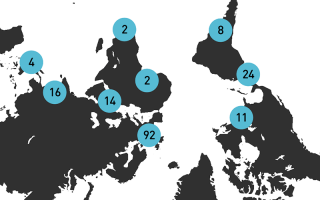Colin recounts experiences of studying MSc Urban Development Planning at the Development Planning Unit
 Program Manager (Southern Africa) – International Youth Foundation
Program Manager (Southern Africa) – International Youth Foundation

Completion of a MSc Urban Development Planning (UDP) degree at the DPU was, for me, an invaluable step in the continued pursuit of working as an effective and socially just international development practitioner.
I came to the DPU in 2010, after having worked almost exclusively in rural development following the completion of my undergraduate degree at the University of Cape Town in 2005, including three years with the Aga Khan Foundation in Mozambique.
Though much of my pre-DPU career was focused on rural development, a substantial portion of my time was actually spent travelling to and living in urbanizing areas of the Global South. In these environments, I became more acutely aware of my own knowledge gaps of urban development dynamics, some of which impacted my work directly. How does one identify quality market opportunities for low-income populations, for example, without an adequate understanding of the rural-to-urban continuum of many value chains? More broadly, I found it difficult to reconcile the fact that I was a development practitioner who spent a significant portion of my time in rapidly urbanizing countries, yet did not fully comprehend the contestations taking place all around me.
For these reasons—combined with a healthy dose of love for urban culture—I chose to study UDP at the DPU. What particularly attracted to me to the course is its non-technocratic approach to planning. The guiding core of UDP is social justice, and related how to engage with urban informality and support more just partnerships between communities and the public and private sectors.
The course is therefore as relevant to an existing Urban Planner as it is to someone engaged in urban social and economic development. That is not to say that technical planning tools are sidelined in DPU courses, but rather that practitioners are taught to draw upon these tools selectively to support more community-centric modes of urban development, such as participatory budgeting and co-production of urban plans and infrastructure.
While studying at the DPU, my counterparts and I also had the opportunity to put theory into practice, including through conducting research in Bangkok to identify opportunities for increasing the scale of a community-led, publically-financed slum upgrading program (Baan Mankong), and developing and presenting urban development design briefs to the London Municipality. I also leveraged my enrollment at the DPU to secure a research internship with the Urban Transport Section at UN-HABITAT in Nairobi. The internship contributed towards my dissertation and subsequent DPU Working Paper, which evaluated the equity of Nairobi’s land-use and transport plans against the livelihood needs of the city’s urban poor.
Following graduation, I returned to Mozambique and worked as an independent consultant for one-year, with assignments including leading the design of new programming at the Aga Khan Foundation and managing the inception phase of a DFID-funded DPU climate change research project in Maputo.
In September 2012, I accepted a position as Program Manager – Southern Africa with the International Youth Foundation (IYF). In my current position, I manage IYF’s expanding program and partnership portfolio in Southern Africa, which is largely focused on increasing quality livelihood opportunities for vulnerable urban youth in the region.
Though I do not work as an Urban Planner in the traditional sense, the knowledge and skills that I gained through the DPU have been hugely valuable to my career. At the broadest level, I am more aware of the key urban contestations occurring in the Global South, and potential pro-poor responses to these challenges—knowledge that has improved the relevance and quality of my work.
Related, in my current position I work in partnership with a wide range of entities, including NGOs, foreign governments and multi-national corporations. It can be a challenge to balance the priorities of these different stakeholders when working towards the goal of expanding youth access to quality livelihood opportunities.
The training that I received from the DPU has been critical in this regard, with social justice providing a guiding framework for outcome-based relationship management. Lastly, I also now regularly integrate spatial analyses into my program research, planning and evaluations, which supports the identification of more promising opportunities and solutions. Taken together, completion of the MSc UDP at the DPU has improved the support that I am able to provide to the organizations and populations that I serve, thereby strengthening my overall role as a development practitioner.
 Close
Close


